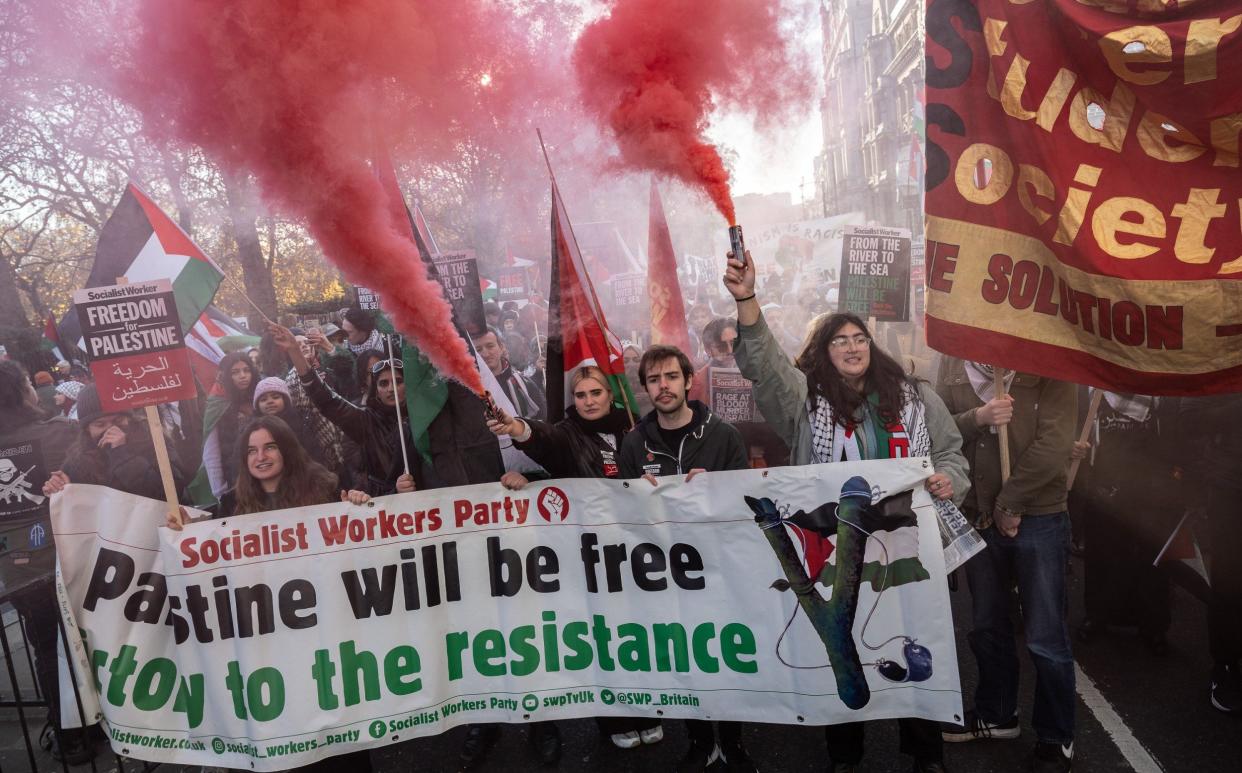The real reason liberals attack Israel

Many people on the Right suspect that liberals who criticise Israel are anti-Semitic. No doubt some of them are. In most cases, though, I don’t think it’s got anything to do with race.
I think it’s got much more to do with class.
In the past, people could instantly tell what class you belonged to by listening to the way you spoke. But it wasn’t just your accent that gave you away. It was also your vocabulary. In the 1950s, Nancy Mitford compiled a list of words that indicated whether their user was common or posh. Common people said “serviette”; posh people said “napkin”. Common people said “toilet”; posh people said “loo”. Common people said “settee”; posh people said “sofa”. And so on.
These particular distinctions matter little today. But that doesn’t mean our society has become any less obsessed with status. All that’s changed is the way status is gauged. Instead of their vocabulary, people are now classified according to their opinions.
It’s an inevitable outcome of the digital age. Social media, to which everyone under the age of 50 has become incurably addicted, is a mode of communication based almost entirely on the sharing, applauding and denigrating of opinions. As a consequence, our opinions have come to define us – and to determine our social status.
If you’re eager to be seen as a superior class of person, therefore, you need to express the opinions that the superior class of people invariably hold. And in the world of social media, these opinions are always progressive ones. Which means you need to show that you, for example, support Black Lives Matter, believe trans women are women, love Greta Thunberg, and loathe Tories.
To express the opposite of these opinions would be a frightful faux pas. Because, in the eyes of the superior class, it’s the 2020s equivalent of saying “settee”, “serviette” and “toilet”. That is, it suggests you’re common – or, as today’s superior class prefer to say, gammon. The two words mean much the same thing. They even sound alike.
Anyway, the result of all this is that much political debate these days, at least online, is worthless. This is because, instead of forming opinions of their own, many people simply parrot the opinions that are most likely to boost their status.
Which brings us back to the debate over Gaza. The superior class all take the Palestinian side. Hence why I think it’s wrong to assume that liberals who criticise Israel are anti-Semitic. Many of them, I suspect, are just painfully insecure, and desperate to gain the approval of their betters.
The BBC has forgotten what it’s for
Why do we still pay the licence fee? I don’t mean that rhetorically. It’s a genuine question. Still, there’s no point asking the people who run the BBC. Because they appear no longer to know.
Look at the reason given for the brutal cuts to Newsnight. Deborah Turness, the boss of BBC News, said it didn’t “make sense” to have a bespoke reporting team on a news programme “with a small and declining audience, however good that programme is”.
But hang on. Surely the BBC isn’t supposed to worry about ratings, like its commercial rivals do. As a public service broadcaster, its job is to produce the type of serious, high-quality programming that commercial rivals tend not to bother with. If the BBC has cut Newsnight merely because it doesn’t attract a mass audience, it’s no longer a public service broadcaster. It’s just a middle-class ITV.
Ms Turness’s other excuse is that the BBC needs to save money. In that case, how about it stops blowing £1.35m a year on Gary Lineker? Otherwise, it’s effectively saying: “Sorry, we’ve got to slash our news budget. It’s the only way we can afford to keep paying eye-watering salaries to celebrities.”
That’s the sort of thing a commercial broadcaster would do. And if the BBC insists on behaving like a commercial broadcaster, it should have to fund itself like one.
Waving bye-bye to the hated mince pie
A hotel in Scotland has announced that this Christmas it won’t be serving mince pies – because guests no longer eat them. “Every year, we buy them, we serve them, then with a very few exceptions we bin them,” sighed Willie Millar, of the Glynhill Hotel in Renfrew.
In these dark times, how heartening it is to read a rare piece of good news. Because at long last, it’s clear, the British people have come to their senses – and realised that mince pies taste absolutely rank.
They do. So teeth-cloggingly thick, sticky and bitter. There’s a good reason people eat the things only once a year. And it’s not tradition.
But then, the same applies to most festive food. Apart from the roast potatoes and gravy – which we eat throughout the year anyway – the standard components of Christmas lunch are at best bland, and at worst foul. Turkey is the drabbest, driest bird on God’s green earth. Brussels sprouts stink of school kitchens. Pigs in blankets are so salty they make your kidneys wince. And Christmas pudding tastes like sugary shoe polish.
This is the real reason why, on Christmas Day, people drink Buck’s fizz with their breakfast. It’s so that, by the time they come to eat lunch, they’ll be so drunk they won’t be able to taste it.
Way of the World is a twice-weekly satirical look at the headlines aiming to mock the absurdities of the modern world. It is published at 7am every Tuesday and Saturday

 Yahoo News
Yahoo News 
